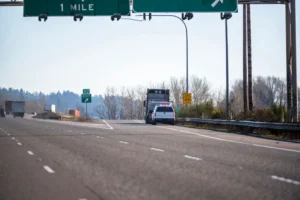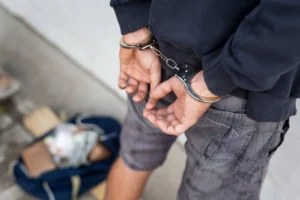One of the most common questions residents have about the driving while intoxicated (DWI) laws in Texas is about the legality of DWI checkpoints. Are these checkpoints legal? Can law enforcement pull you over without cause? What should you do if you find yourself facing a roadside stop?
These are more than just theoretical questions — they affect real people every day in Bexar County and surrounding areas. While Texas law technically prohibits DWI checkpoints, that doesn’t mean law enforcement doesn’t look for ways around the rules. And if you’ve been stopped or arrested on suspicion of DWI, it’s essential to know your rights and options.
If you’re dealing with a DWI charge or have questions about how law enforcement conducted your stop, reach out to Guzman Law Firm at (956) 516-7198. A skilled DWI defense attorney can make the difference between a conviction and a cleared name.
Can I refuse a DWI checkpoint in Texas?
Let’s clear this up from the start: Texas does not permit sobriety checkpoints under current state law. The Texas Court of Criminal Appeals ruled them unconstitutional in 1991 in State v. Holt, citing a violation of Article I, Section 9 of the Texas Constitution, which mirrors the protections of the Fourth Amendment of the U.S. Constitution.
So, if you encounter what appears to be a DWI checkpoint in San Antonio or elsewhere in Texas, you’re not legally required to comply because the checkpoint itself should not exist in the first place. But that doesn’t mean officers can’t stop you by other means.
Here’s the bottom line: police can still stop drivers if they have reasonable suspicion or probable cause. Officers may try to frame a roadblock as a “safety check” or conduct stops in areas with high DWI arrest rates, calling it “targeted enforcement.” These are legal gray areas that require careful scrutiny from a defense lawyer.
So, if you believe you were stopped at what functioned like a DWI checkpoint in Texas, you have every right to question its legality and validity in court — but you shouldn’t do it without a skilled attorney.
Do checkpoints violate the 4th Amendment?
The Fourth Amendment protects against unreasonable searches and seizures, meaning that law enforcement must have probable cause or a warrant to search your vehicle or detain you, unless there are specific exceptions.
Different states actually disagree on whether or not these violate your constitutional rights; in Michigan Dept. of State Police v. Sitz (1990), the U.S. Supreme Court ruled that sobriety checkpoints do not inherently violate the Fourth Amendment, so long as they are conducted in a reasonable manner.
Texas, however, has chosen not to allow these exceptions. The Texas Court of Criminal Appeals holds that DWI checkpoints are not justified under the Texas Constitution, making them unlawful in the state regardless of the federal ruling.
This is a critical distinction. What’s legal under federal law isn’t always legal under Texas law. That’s why it’s so important to speak with a Texas-based DWI attorney who understands the state’s specific protections.
Do you have to show ID at a DWI checkpoint in Texas?
Even though traditional DWI checkpoints are illegal, Texas law still allows police to request identification during a lawful stop. If you are pulled over for a legitimate reason (e.g., a traffic violation or erratic driving), you are required to show your driver’s license and proof of insurance, failure to do so can be grounds for license suspension in Texas.
But if you’re stopped at what seems like an unlawful checkpoint, the situation becomes murky.
Your rights:
- You are not required to answer questions about where you’ve been, whether you’ve been drinking, or where you’re going.
- You must identify yourself if the officer has legally detained you.
- You don’t have to consent to a search unless the officer has probable cause, a warrant, or your explicit permission.
Always be polite, but make sure not to incriminate yourself or say more than necessary. Remember that anything you say can be used against you, so the less you say, the better.
Can you turn around before a DWI checkpoint?
Let’s say you see a roadblock ahead. Can you legally make a U-turn or take a side street to avoid it? The short answer: Yes, but with caution.
Since DWI checkpoints aren’t legal in Texas, what you’re likely seeing is a saturation patrol or a roadblock labeled as a safety check. If you legally turn around before reaching it, without breaking traffic laws, officers technically can’t stop you just for avoiding the stop.
But here’s what law enforcement may do:
- Watch for “suspicious behavior” after you turn around
- Follow you and look for a traffic violation (like not signaling a turn or rolling through a stop sign) to justify a stop
- Claim probable cause based on driving behavior, like swerving or speeding
So while turning around is not illegal, the maneuver can draw attention. If you’re stopped afterward, anything you say or do might be scrutinized.
What is the difference between sobriety checkpoints and saturation patrols?
Even though sobriety checkpoints are not allowed in Texas, saturation patrols are a common workaround used by law enforcement.
Here’s the difference:
| Sobriety checkpoints (illegal in Texas) | Saturation patrols |
| Involve officers setting up a roadblock where every vehicle, or a predetermined number, is stopped to check for signs of intoxication, regardless of whether the driver shows suspicious behavior. | Roving units of officers deployed in areas known for DWI incidents. They do not involve stopping vehicles without cause. Instead, officers look for any traffic violation, like speeding, swerving, or a broken taillight, to justify pulling someone over. |
This difference matters. A checkpoint is randomized and requires no specific reason to stop a driver, while a saturation patrol must be based on observed behavior or probable cause.
Unfortunately, some law enforcement officers may improperly blur the line between the two, effectively conducting illegal checkpoints disguised as high-traffic patrols.
How a San Antonio DWI lawyer can help in these situations
If you’ve been pulled over or arrested under suspicion of DWI, whether at a questionable stop, saturation patrol, or alleged checkpoint, the next steps are critical. Here’s what you should expect from the best DWI lawyer in San Antonio:
- Challenge the legality of the stop. If your rights were violated, any evidence (like breathalyzer results) may be thrown out.
- Scrutinize police conduct. Were you coerced into answering questions? Did the officer follow protocol?
- Fight unlawful or improper search and seizure. Without probable cause or consent, any evidence obtained may be inadmissible.
- Negotiate reduced charges or dismissals. Especially if the arrest stemmed from a legally shaky stop.
- Represent you in court. With a deep understanding of Texas DWI law, constitutional protections, and local court systems.
You don’t have to face the system alone. The sooner you contact a defense lawyer, the more options you’ll have.
Know your rights: what you should and shouldn’t say
Knowing your rights when the moment comes is crucial to protecting your right to drive — especially when facing your first DWI offense in Texas:
| Do | Don’t |
| ✓ Provide your ID, license, and proof of insurance if lawfully stopped. ✓ Be polite and respectful. ✓ Clearly state you are invoking your right to remain silent. ✓ Request an attorney before answering questions. | ✗ Admit to drinking — even “just one beer.” ✗ Volunteer information about where you’re coming from or going. ✗ Consent to a vehicle search without a warrant. ✗ Assume the stop was lawful; let your attorney make that call. |
Call Guzman Law Firm for a strong DWI defense
If you were pulled over at a questionable DWI stop in San Antonio — or anywhere in Texas — you don’t have to navigate the situation alone. Javier Guzman of Guzman Law Firm is prepared to defend your constitutional rights and build a strong case against unlawful traffic stops that function like DWI checkpoints, and DWI charges.
Don’t let a single stop cost you your license, job, or freedom. Call (956) 516-7198, or schedule a confidential consultation online. We’ll listen to your story, investigate the facts, and fight to protect your rights every step of the way.
More Helpful Articles by Guzman Law Firm:
- Penalties for Aggravated Assault in Texas
- What Is Comparative Negligence in Texas Personal Injury?
- 5 Things to Know about a Third DWI in Texas
- Do I Qualify for DWI Expungement in Texas?
- How to Get a Possession Charge Dismissed





